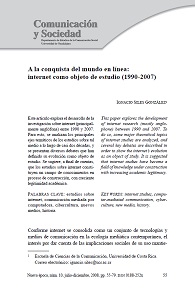A la conquista del mundo en línea: internet como objeto de estudio (1990–2007)
DOI:
https://doi.org/10.32870/cys.v0i10.1843Palabras clave:
estudios sobre internet, comunicación mediada por computadora, cibercultura, nuevos medios, historiaResumen
Este artículo explora el desarrollo de la investigación sobre internet (principalmente anglófona) entre 1990 y 2007. Para esto, se analizan los principales ejes temáticos de los estudios sobre tal medio a lo largo de casi dos décadas, y se presentan diversos debates que han definido su evolución como objeto de estudio. Se sugiere, a final de cuentas, que los estudios sobre internet constituyen un campo de conocimientos en proceso de construcción, con creciente legitimidad académica.Descargas
Citas
Aronowitz, S., Martinsons, B., Menser, M., & Rich, J. (eds.) (1996) Technoscience and cyberculture, New York: Routledge.
Bakardjieva, M. (2005) Internet society: the internet in everyday life, London: Sage.
Barlow, J. P. (1995) "Is there a there in cyberspace?", Utne Reader (March–April).
Baym, N. K. (1995) "The emergence of community in computer–mediated communication", en S. G. Jones (ed.),Cybersociety: computer mediated communication and community, Thousand Oaks, CA: Sage.
Baym, N. K. (2000) Tune in, log on: soaps, fandom, and online community, Thousand Oaks: Sage.
Baym, N. K. (2005) "Internet research as it isn't, is, could be, and should be", The Information Society,21(4).
Beaulieu, A. (2004) "Mediating ethnography: objectivity and the making of ethnographies of the internet", Social Epistemology, 18 (2–3).
Beaulieu, A. (2005) "Sociable hyperlinks: an ethnographic approach to connectivity", en C. Hine (ed.), Virtual Methods, Oxford: Berg.
Bell, D. (2001) An introduction to cybercultures, London: Routledge.
Bell, D. y Kennedy, B. M. (2000) The cybercultures reader, New York: Routledge.
Bingham, N. (1999) "Unthinkable complexity? Cyberspace otherwise", en M. Crang, P. Crang & J. May (eds.),Virtual geographies: bodies, space and relations, New York: Routledge.
Boczkowski, P. J. (2004) "Books to think with", New Media & Society, 6(1).
Bowker, G. C. (1998) "Modest reviewer goes on virtual voyage: some recent literature of cyberspace",Technology and Culture, 39(3).
Carey, J. W. (2005) "Historical pragmatism and the internet", New Media & Society, 7(4).
Danet, B., & Herring, S. C. (2003) "The Multilingual internet", Journal of Computer–Mediated Communication,9(1).
Danet, B., y Herring, S. C. (eds.) (2007) The multilingual internet: language, culture, and communication online, Oxford: Oxford University Press.
Dibbell, J. (1993) "A rape in cyberspace; or how an evil clown, a haitian trickster spirit, two wizards, and a cast of dozens turned a database into a society", The Village Voice.
Escobar, A. (2000) "Welcome to cyberia: notes on the anthropology of cyberculture", en D. Bell & B. M. Kennedy (eds.), The Cybercultures Reader, London: Routledge.
Featherstone, M., & Burrows, R. (eds.) (1995) Cyberspace/cyber–bodies/cyberpunk, London: Sage.
Fernback, J. (2007) "Beyond the diluted community concept: a symbolic interactionist perspective on online social relations", New Media & Society, 9(1).
Fernback, J. y Thompson, B. (1995) "Computer–mediated communication and the american collectivity: the dymensions of community within cyberspace", International Communication Association.
Flichy, P. (2001) L 'imaginaire d'internet, Paris: La Découverte.
Fuentes Navarro, R. (2000) Educación y telemática (Enciclopedia Latinoamericana de Sociocultura y Comunicación, vol. 6), Bogotá: Norma.
Foot, K. A., & Schneider, S. M. (2006) Web campaigning, Cambridge, MA: MIT Press.
Gibson, W. (1984) Neuromancer, New York: Ace.
Gillespie, T. (2007) Wired shut: copyright and the shape of digital culture, Cambridge, MA: MIT Press.
Goggin, G., & McLelland, M. (eds.) (2007) Internationalizing internet studies: beyond anglophone paradigms,London: Routledge.
Haythornthwaite, C., & Wellman, B. (eds.) (2002) The internet in everyday life, Malden, MA: Blackwell.
Heim, M. (1993) The metaphysics of virtual reality, New York: Oxford University Press.
Hine, C. (2000) Virtual ethnography, London: Sage.
Hine, C. (2005a) "Internet research and the sociology of cyber–social–scientific knowledge", The information society, 21(4).
Hine, C. (ed.) (2005b) Virtual methods: issues in social research on the internet, Oxford: Berg.
Hine, C. (2007) "Connective ethnography for the exploration of e–science", Journal of Computer–Mediated Communication, 12(2).
Howard, P. N., & Jones, S. (eds.) (2004) Society online: the internet in context, Thousand Oaks, CA: Sage.
Jankowski, N. W. (2006) "Creating community with media: history, theories and scientific investigations", en L. Lievrouw & S. Livingstone (eds.), The handbook of new media, London: Sage.
Jensen, J. F. (1999) "Interactivity: tracking a new concept in media and communication studies", en P. A. Mayer (ed.), Computer mediated communication: a reader, Oxford: Oxford University Press.
Jones, S. (ed.) (1995) Cybersociety: computer–mediated communication and community, London: Sage.
Jones, S. (ed.) (1997) Virtual culture: identity and communication in cybersociety, Thousand Oaks, CA: Sage.
Jones, S. (ed.) (1998) Cybersociety 2.0: Revisiting computer–mediated–communication and community,Thousand Oaks, CA: Sage.
Jones, S. (ed.) (1999) Doing internet research: critical issues and methods for examining the net, Thousand Oaks, CA: Sage.
Jones, S. (2005) "Fizz in the field: toward a basis for an emergent internet studies", The information society,21(4).
Jones, S. (2006) "Foreword: dreams of fields: possible trajectories of internet studies", en D. Silver & A. Massanari (eds.), Critical cyberculture studies, New York: New York University Press.
Landow, G. P. (1997) Hypertext 2.0: the convergence of contemporary critical theory and technology,Baltimore: John Hopkins Press.
Latour, B. (1997 (1991)) Nous n'avons jamais été modernes: essai d'anthropologie symétrique, Paris: La Découverte.
Lea, M., y Spears, R. (1991) "Computer–mediated communication, de–individuation and group decision–making", International Journal of Man–Machine Studies, 34(2).
Lievrouw L., & Livingstone, S. (eds.) (2006) Handbook of new media: social shaping and social consequences of ICTs (Updated Student ed.) London: Sage.
Livingstone, S. (2005) "Critical debates in internet studies: reflections on an emerging field", en J. Curran & M. Gurevitch (eds.), Mass Media and society, 4th Edition. London: Hodder Arnold.
Livingstone, S. (2007) "On the material and the symbolic: Silverstone's double articulation of research traditions in new media studies", New media & society, 9(1).
Miller, D., & Slater, D. (2000) The internet: an ethnographic approach, Oxford: Berg.
Nakamura, L. (2002) Cybertypes: race, ethnicity, and identity on the internet, London: Routledge.
Nakamura, L. (2006) "Cultural difference, theory, and cyberculture studies: a case of mutual repulsion", en D. Silver & A. Massanari (eds.), Critical cyberculture studies, New York: New York University Press.
Newhagen, J. E., & Rafaeli, S. (1996) "Why do communication researchers should study the internet: a dialogue", Journal of Communication, 46(1).
Park, H. W., & Thelwall, M. (2003) "Hyperlink analyses of the world wide web: a review". Journal of Computer–Mediated Communication, 8(4), http://jcmc.indiana.edu/vol8/issue4/park.html
Park, H. W., & Thelwall, M. (2005) "The network approach to web hyperlink research and its utility for science communication", en C. Hine (ed.), Virtual Methods. Oxford: Berg.
Proulx, S., & Latzko–Toth, G. (2000) "La virtualité comme catégorie pour penser le social: l'usage de la notion de communauté virtuelle", Sociologie et Sociétés, XXXII (2).
Rheingold, H. (2000) The virtual community: homesteading on the electronic frontier (revised ed.), Cambridge, MA: MIT Press.
Rice, R. E., & Love, G. (1987) "Electronic emotion: socioemotional content in a computer–mediated communication network", Communication Research, 14(1).
Robinson, L. (2007) "The cyberself: the selfing project goes online, symbolic interaction in the digital age", New Media & Society, 9(1).
Rudy, I. A. (1994) "A bibliography of organizational computer–mediated communication", en:http://shum.cc.huji.ac.il/jcmc/rudybib.html
Schaap, F. (2006) "Disaggregation, technology, and masculinity: elements of internet research", en D. Silver & A. Massanari (eds.), Critical cyberculture studies, New York: New York University Press.
Schneider, S. M., & Foot, K. A. (2004) "The web as an object of study", New Media & Society,6(1).
Shields, R. (ed.) (1996) Cultures of internet: virtual spaces, real histories, living bodies, Thousand Oaks, CA: Sage.
Siles, I. (2005) "Internet, virtualidad y comunidad". Revista de Ciencias Sociales, 108(II).
Silver, D. (2000) "Looking backwards, looking forwards: cyberculture studies 1990–2000", en D. Gauntlett (ed.),Web.Studies: rewiring media studies for the digital age, Oxford: Oxford University Press.
Silver, D. (2004) "Internet/cyberculture/digital culture/new media/fill–in–the–blank studies", New Media & Society, 6(1.
Silver, D. y Massanari, A. (2006) Critical cyberculture studies, New York: New York University Press.
Silverstone, R. (1994) Television and everyday life, London: Routledge.
Slater, D. (2003) "Modernity under construction: building the internet in Trinidad", en T. J. Misa, P. Brey & A. Feenberg (eds.), Modernity and rechnology, Cambridge, MA: MIT Press.
Smith, M. A. (1999) "Invisible crowds in cyberspace: mapping the social structure of the usenet", en M. A. Smith & P. Kollock (eds.), Communities in cyberspace, London: Routledge.
Sproull, L., & Kiesler, S. (1991) Connections: new ways of working in the networked organization,Cambridge,MA: MIT Press.
Star, S. L. (ed.) (1995) The cultures of computing, Oxford: Blackwell.
Stefik, M. (ed.) (1996) Internet dreams: archetypes, myths, and metaphors, Cambridge, MA: MIT Press.
Sterne, J. (1999) "Thinking the internet: cultural studies versus the millennium", en S. Jones (ed.), Doing internet research: critical issues and methods for examining the net, Thousand Oaks, CA: Sage.
Sterne, J. (2005) "Digital media and disciplinarity", The information Society, 21(4).
Sterne, J. (2006) "The historiography of cyberculture", en D. Silver & A. Massanari (eds.), Critical cyberculture studies, New York: New York University Press.
Stone, A. R. (1991) "Will the real body please stand up?: boundary stories about virtual cultures", en M. Benedikt (ed.), Cyberspace: first steps, Cambridge, MA: MIT Press.
Stone, A. R. (1996) The war of desire and technology at the close of the mechanical age, Cambridge, MA: MIT Press.
Thomsen, S. R., Straubhaar, J. D., & Bolyard, D. M. (1998) Ethnomethodology and the study of online communities: exploring the cyber streets, paper presented at the IRISS' 98, Bristol, UK.
Turkle, S. (1995) La vida en la pantalla, Barcelona: Paidós ((1997) Life on the screen: identity in the age of the internet, New York: Simon & Schuster). [ Links ]
Turner, F. (1999) "Cyberspace as the new frontier?: mapping the shifting boundaries of the network society" (electronic version). Red Rock Eater News Service, June 6 fromwww.stanford.edu/~fturner/Turner%20Cyberspace%20Red%20Rock%20Eater%201999.pdf
Turner, F. (2005) "Where the counterculture met the new economy: the Well and the origins of virtual community", Technology and Culture, 46.
Wakeford, N. (2000) "New media, new methodologies: studying the web", en D. Gauntlett (ed.), Web.Studies: rewiring media studies for the digital age, Oxford: Oxford University Press.
Walther, J. B., Gay, G., & Hancock, J. T. (2005) "How do communication and technology researchers study the internet?", Journal of Communication, 55(3).
Watt, S. E., Lea, M., & Spears, R. (2002) "How social is internet communication? a reappraisal of bandwidth and anonymity effects", en S. Woolgar (ed.), Virtual society? technology, cyberbole, reality. Oxford: Oxford University Press.
Wellman, B. (2004) "The three ages of internet studies: ten, five and zero years ago", New Media & Society,6(1).
Wellman, B. y Gulia, M. (1999) "Virtual communities as communities: net surfers don't ride alone", en M. A. Smith & P. Kollock (eds.), Communities in cyberspace, New York: Routledge.
Wise, J. M. (1997). Exploring technology and social space, Thousand Oaks, CA: Sage.

Descargas
Publicado
Cómo citar
Número
Sección
Licencia
Los autores/as que publiquen en esta revista aceptan las siguientes condiciones:
De acuerdo con la legislación de derechos de autor, los autores conservan los derechos de autoría y otorgan a Comunicación y Sociedad el derecho de primera comunicación pública de la obra. Comunicación y Sociedad no realiza cargos a los autores por enviar y procesar artículos para su publicación.
Los autores/as pueden realizar otros acuerdos contractuales independientes y adicionales para la distribución no exclusiva de la versión del artículo publicado en Comunicación y Sociedad (por ejemplo incluirlo en un repositorio institucional o publicarlo en un libro) siempre que indiquen claramente que el trabajo se publicó por primera vez en Comunicación y Sociedad.










